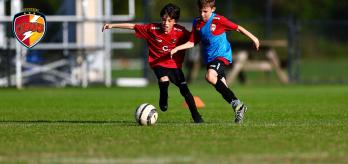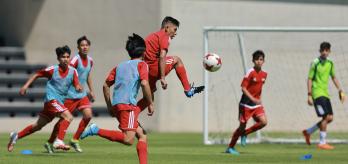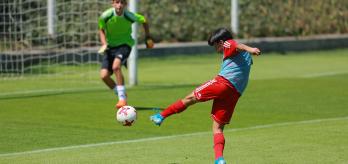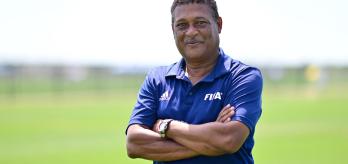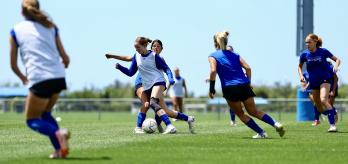Corneal, who is also a FIFA Technical Leadership Consultant, is a figure who has been deeply embedded in the development of football in the Caribbean. With decades of experience under his belt at youth and senior levels, he remains committed to the foundational stages of the game.
In an interview with the FIFA Training Centre, Corneal shares his insights on grassroots football and how its landscape is evolving in Trinidad and Tobago, while also discussing why ball manipulation is a core skill that coaches should teach young players from an early age.
KEY POINTS
-
Corneal believes that good communication and strong leadership form the basis of creating a positive grassroots environment for players to develop their craft.
-
The TTFA began a ‘Shorelines’ initiative, which helps extend football access to peripheral coastal regions.
-
Learn why training camps are great for skill development and why planning is integral to maximising their benefits.
GENERAL PRINCIPLES OF GRASSROOTS COACHING
Corneal’s philosophy on grassroots coaching is centred on a clear emphasis of what matters most at this level: creating a fun, safe, and effective environment where young players can enjoy the game and develop their skills.
Fun is the key to grassroots football
He highlights fun as the main principle that grassroots coaches should emphasise during training sessions and games. At grassroots level, football is still a form of recreation for many young players, and coaches should ensure that the environment puts having fun at its centre. Corneal believes that the football pitch should be a home away from home for players and that results cannot become the driving force for learning.
“We have to be very careful with how we tie results into players having fun,” he said. “Fun is the foundation of growth, especially for younger players, so we need to make sure that we can get them to love the game. We focus on a fun, safe environment, a home away from home, where individuals can relate to one another, build proper camaraderie, especially at the younger level, and gain opportunities for valuable life lessons."
However, building a fun, safe grassroots environment is easier said than done. Corneal believes that empathetic communication with players and strong leadership hold the key to creating these conditions.
“I think it starts with leadership. How you lead, how you speak to players, how you communicate with them. There should also be a level of acceptance, a level of understanding by looking through the eyes of the young players. Once that’s done, I think the coach can adapt easily to what they believe is best.”
"I’ve been very fortunate to have coached at the highest level, but I cannot ever forget where I came from."
Changing the mindset of “winning”
Nevertheless, competition is still a part of the game, even at grassroots level. As Corneal says, “It’s human nature to be competitive.” As a coach educator, though, he still insists it is integral to teach young players that the bigger picture is more important than winning.
“What is winning? Winning changes with the age group. I’ll give you an example. If you were to pass and receive the ball properly, that is winning. If you trained better than the day before, that is a form of winning.”
Once more, Corneal insists that this shift in mentality to focus on the bigger picture of doing the basics properly and training well, among a plethora of other important, minute details, comes from a coach displaying strong leadership qualities and understanding the needs of their players.
“Of course, winning comes down to results,” he begins. “However, we must make sure that we are able to compliment, to reward, to value what players are doing, but also to alert them to how they can value what they're doing themselves. It really comes down to a coach with proper leadership qualities, understanding the needs of the players.”
What still motivates Corneal?
Having worked at the very highest level in football, in a wealth of different roles, including several years in his current position as the Technical Director of the TTFA, Corneal still has an infectious drive to support the development of players in the grassroots game. He puts this motivation down to the belief that supporting the development of grassroots football leads to a higher-level output further up the pyramid.
“The biggest motivation for me is how we can improve what we do at grassroots level. How can we grow the game and the women’s game? How can we work with clubs and academies? What can we do to get people more interested in the game? I’ve been very fortunate to have coached at the highest level, but I cannot ever forget where I came from,” he said poetically.
The grassroots game in Trinidad and Tobago
In line with Corneal’s commitment to strengthening the foundation of the game, Trinidad and Tobago’s grassroots scene has grown significantly in recent years, driven by increased access, coach education, and a focus on long-term player development.
Supporting academies in Trinidad and Tobago
The grassroots game in Trinidad and Tobago has flourished in recent years, with new academies cropping up all over the country, particularly over the past decade. Corneal states that there are over 160 registered academies on the island, ranging from community-based groups to well-resourced institutions. This diversity, while beneficial for the outreach of football in Trinidad, presents its own challenges in maintaining consistent standards.
However, to push for an alignment in the curriculum of each academy, Corneal reveals that the TTFA has afforded coach education to each of them. “There is a place for coach education at each level,” Corneal says. “We want to provide an opportunity and a pathway for coaches and grassroots players. I think it’s important to make sure that all the programmes are aligned to each other.
“We have specific courses that will deal with academies, courses that will deal with our primary schools, and courses that will deal with our secondary schools, but we have to make sure that they are aligned and progressive.” The outcome has been a well-mapped journey for both coaches and players.
Despite a population of less than 1.5 million people, the country’s size brings certain advantages for the TTFA. For instance, Corneal claims that, while the TTFA cannot embed a coach educator at every club on the island, they maintain frequent, face-to-face connections with coaches through coach education programmes.
“We have CPDs where coaches can come in and get additional information from us, and, because of how the programme is designed, every three years, we get to see the C-Licence coaches again. If they are progressing, we’re able to have interviews to make sure that they are ready to go to the next level of their coaching development.”
The ‘Shorelines’ initiative
Nevertheless, granting access to coaching resources for the coastal regions of Trinidad and Tobago has proven to be a challenge for the TTFA in the past, but Corneal discusses a relatively new initiative called the ‘Shorelines’ programme, which can help integrate more formal coach education to these obscure areas. As he explains, “We invited coaches from those areas into our coach education programmes so they can carry the information back to their villages.”
While there are still challenges to the shoreline regions of Trinidad, particularly the lack of formal, organised competition, the Technical Director notes that, “Four or five years into it [the programme], we are now seeing players coming through some of those shorelines into our national youth teams,” highlighting the benefits of this strategy on underserved regions.
Integrating a Pro Licence
It is also an exciting time to be a coach in Trinidad and Tobago. Since 2014, there has been an ad-hoc shift to creating more structured learning for coaches through obtaining licences. Using information and expertise from Europe, particularly the Netherlands, Belgium and England, the TTFA have produced C, B, and A licences and are just weeks away from launching the Pro Licence.
“The first Pro licence is going to be implemented in the coming weeks,” Corneal says. “We are really excited. It’s a pilot project, and we have people coming in from Europe to help us with that until we have people in our region who will be able to present such a course themselves.” This will not only be beneficial for coaches in providing a professional pathway in the game, but will certainly improve the quality of learning for the grassroots game as well.
The foundational skill
The FIFA Training Centre recently filmed a session with Corneal on the topic of ball manipulation, which he himself believes to be the most foundational skill in technical development for young players.
Why is ball manipulation so important?
The session is centred on a series of exercises that help a player to build a better relationship with the ball and their feet.
“An end-product player needs to be comfortable with the ball, but this doesn’t come to them as an adult,” Corneal says. “It has to come when players are still learning, they’re forming neuromuscular patterns, they’re building a relationship with the ball.
“Young players today aren’t playing informally like before, so we have to recreate those touches in training. They’re building a relationship with the ball, using all surfaces, working on coordination, balance, and agility.”
Additionally, Corneal encourages integrating these exercises as part of warm-ups or early-session activities, followed by small-sided games where the skills can emerge naturally. “When a player is confident with the ball, their decision-making improves. They react better and become more proactive. It transforms their game.” The result of ball-manipulation exercises is not just better technique, but smarter, more expressive and more fearless young players.
Getting the most out of camps
Finally, as someone well-versed in hosting large groups of players in football camps, Corneal took time to dissect their benefits for young children, while offering advice to coaches on how to get the most out of camps.
“The benefit of camps is just having a concentrated amount of time doing work over a period of two to three days because, a lot of the time, you’ll have three sessions in that one day,” he says. “It’s really an advantage when you’re able to work with those players and actually progress some of the sessions within the camp.”
Managing large participant numbers is a known challenge, one which Corneal addresses through careful planning and organisation. By dividing players into small groups, which he refers to as “magic numbers”, he ensures that no one is left idle and that every session remains active and engaging.
These camps not only benefit the players by exposing them to high-level coaching and practical drills, but also serve as mentoring opportunities for local coaches. By working alongside the TTFA team, regional coaches gain first-hand insight into methodologies that they can take back into their own environments, helping to build consistency across the national grassroots structure.
Summary
-
Corneal believes that the key to creating a fun, safe, and competitive grassroots environment is through the coach showing strong leadership and empathetic communication with the players.
-
The TTFA have been working closely with academies of all levels, ensuring accessibility to coach education for those in peripheral coastal regions in particular.
-
Ball manipulation is a foundational skill for young players and training should be designed to replicate informal play and build comfort, coordination, and confidence with the ball.




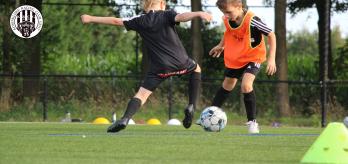
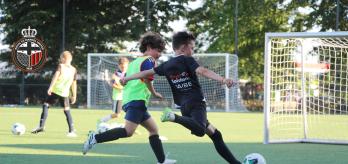

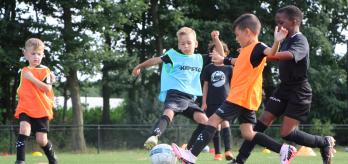

.variant64x64.jpg)

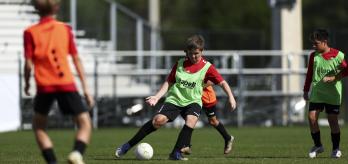
.variant348x164.jpg)
